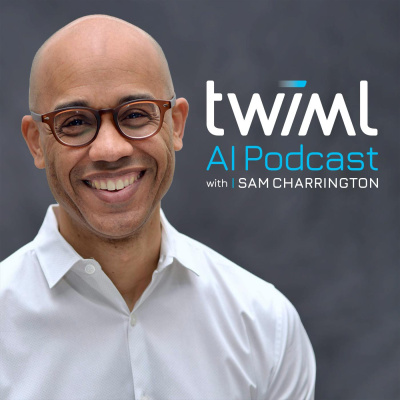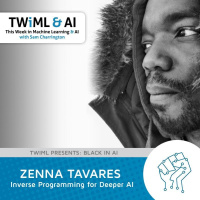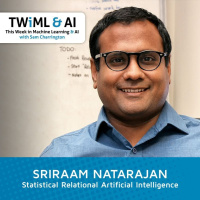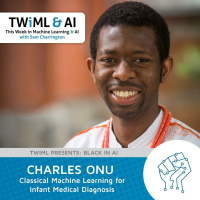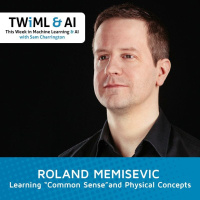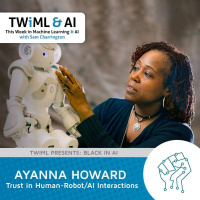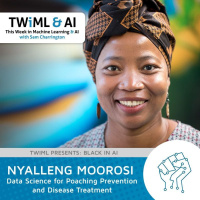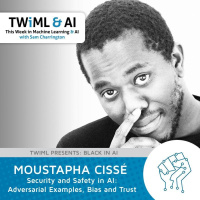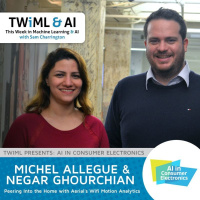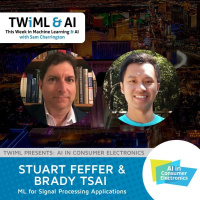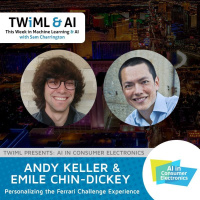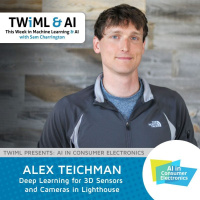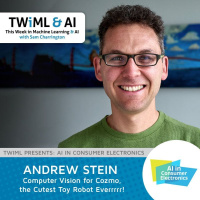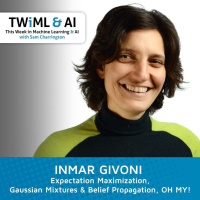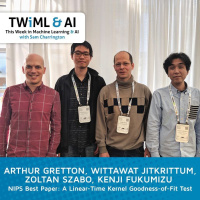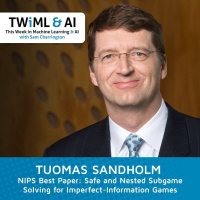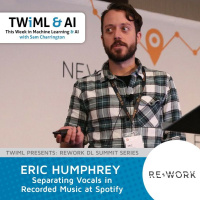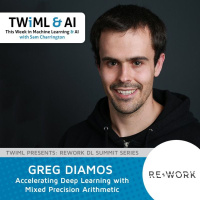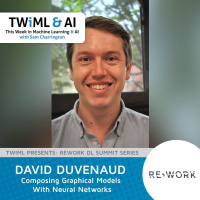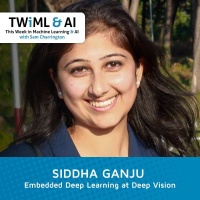Sinopsis
This Week in Machine Learning & AI is the most popular podcast of its kind. TWiML & AI caters to a highly-targeted audience of machine learning & AI enthusiasts. They are data scientists, developers, founders, CTOs, engineers, architects, IT & product leaders, as well as tech-savvy business leaders. These creators, builders, makers and influencers value TWiML as an authentic, trusted and insightful guide to all thats interesting and important in the world of machine learning and AI.Technologies covered include: machine learning, artificial intelligence, deep learning, natural language processing, neural networks, analytics, deep learning and more.
Episodios
-
Inverse Programming for Deeper AI with Zenna Tavares - TWiML Talk #114
26/02/2018 Duración: 28minFor today’s show, the final episode of our Black in AI Series, I’m joined by Zenna Tavares, a PhD student in the both the department of Brain and Cognitive Sciences and the Computer Science and Artificial Intelligence Lab at MIT. I spent some time with Zenna after his talk at the Strange Loop conference titled “Running Programs in Reverse for Deeper AI.” Zenna shares some great insight into his work on program inversion, an idea which lies at the intersection of Bayesian modeling, deep-learning, and computational logic. We set the stage with a discussion of inverse graphics and the similarities between graphic inversion and vision inversion. We then discuss the application of these techniques to intelligent systems, including the idea of parametric inversion. Last but not least, zenna details how these techniques might be implemented, and discusses his work on ReverseFlow, a library to execute tensorflow programs backwards, and Sigma.jl a probabilistic programming environment implemented in the dynamic progra
-
Statistical Relational Artificial Intelligence with Sriraam Natarajan - TWiML Talk #113
23/02/2018 Duración: 47minIn this episode, I speak with Sriraam Natarajan, Associate Professor in the Department of Computer Science at UT Dallas. While at NIPS a few months back, Sriraam and I sat down to discuss his work on Statistical Relational Artificial Intelligence. StarAI is the combination of probabilistic & statistical machine learning techniques with relational databases. We cover systems learning on top of relational databases and making predictions with relational data, with quite a few examples from the healthcare field. Sriraam and his collaborators have also developed BoostSRL, a gradient-boosting based approach to learning different types of statistical relational models. We briefly touch on this, along with other implementation approaches. Join the #MyAI Discussion! As a TWiML listener, you probably have an opinion on the role AI will play in our lives, and we want to hear your take. Sharing your thoughts takes two minutes, can be done from anywhere, and qualifies you to win some great prizes. So hit pause, and jump
-
Classical Machine Learning for Infant Medical Diagnosis with Charles Onu - TWiML Talk #112
20/02/2018 Duración: 48minIn this episode, part 4 in our Black in AI series, i'm joined by Charles Onu, Phd Student at McGill University in Montreal & Founder of Ubenwa, a startup tackling the problem of infant mortality due to asphyxia. Using SVMs and other techniques from the field of automatic speech recognition, Charles and his team have built a model that detects asphyxia based on the audible noises the child makes upon birth. We go into the process he used to collect his training data, including the specific methods they used to record samples, and how their samples will be used to maximize accuracy in the field. We also take a deep dive into some of the challenges of building and deploying the platform and mobile application. This is a really interesting use case, which I think you’ll enjoy. Join the #MyAI Discussion! As a TWiML listener, you probably have an opinion on the role AI will play in our lives, and we want to hear your take. Sharing your thoughts takes two minutes, can be done from anywhere, and qualifies you to win
-
Learning "Common Sense" and Physical Concepts with Roland Memisevic - TWiML Talk #111
15/02/2018 Duración: 32minIn today’s episode, I’m joined by Roland Memisevic, co-founder, CEO, and chief scientist at Twenty Billion Neurons. Roland joined me at the RE•WORK Deep Learning Summit in Montreal to discuss the work his company is doing to train deep neural networks to understand physical actions. In our conversation, we dig into video analysis and understanding, including how data-rich video can help us develop what Roland calls comparative understanding, or AI “common sense”. We briefly touch on the implications of AI/ML systems having comparative understanding, and how Roland and his team are addressing problems like getting properly labeled training data. Enter Our #MyAI Contest! Are you looking forward to the role AI will play in your life, or in your children’s lives? Or, are you afraid of what’s to come, and the changes AI will bring? Or, maybe you’re skeptical, and don’t think we’ll ever really achieve enough with AI to make a difference? In any case, if you’re a TWiML listener, you probably have an opinion on the r
-
Trust in Human-Robot/AI Interactions with Ayanna Howard - TWiML Talk #110
13/02/2018 Duración: 46minIn this episode, the third in our Black in AI series, I speak with Ayanna Howard, Chair of the Interactive School of Computing at Georgia Tech. Ayanna joined me for a lively discussion about her work in the field of human-robot interaction. We dig deep into a couple of major areas she’s active in that have significant implications for the way we design and use artificial intelligence, namly pediatric robotics and human-robot trust. That latter bit is particularly interesting, and Ayanna provides a really interesting overview of a few of her experiments, including a simulation of an emergency situation, where, well, I don’t want to spoil it, but let’s just say as the actual intelligent beings, we need to make some better decisions. Enjoy! Are you looking forward to the role AI will play in your life, or in your children’s lives? Or, are you afraid of what’s to come, and the changes AI will bring? Or, maybe you’re skeptical, and don’t think we’ll ever really achieve enough with AI to make a difference? As a TWi
-
Data Science for Poaching Prevention and Disease Treatment with Nyalleng Moorosi - TWiML Talk #109
08/02/2018 Duración: 52minFor today’s show, I'm joined by Nyalleng Moorosi, Senior Data Science Researcher at The Council for Scientific & Industrial Research or CSIR, in Pretoria, South Africa. In our discussion, we discuss two major projects that Nyalleng is apart of at the CSIR, one, a predictive policing use case, which focused on understanding and preventing rhino poaching in Kruger National Park, and the other, a healthcare use case which focuses on understanding the effects of a drug treatment that was causing pancreatic cancer in South Africans. Along the way we talk about the challenges of data collection, data pipelines and overcoming sparsity. This was a really interesting conversation that I’m sure you’ll enjoy. Be sure to check out some of the great names that will be at the AI Conference in New York, Apr 29–May 2, where you'll join the leading minds in AI, Peter Norvig, George Church, Olga Russakovsky, Manuela Veloso, and Zoubin Ghahramani. Explore AI's latest developments, separate what's hype and what's really game-cha
-
Security and Safety in AI: Adversarial Examples, Bias and Trust w/ Moustapha Cissé - TWiML Talk #108
06/02/2018 Duración: 50minIn this episode I’m joined by Moustapha Cissé, Research Scientist at Facebook AI Research Lab (or FAIR) Paris. Moustapha’s broad research interests include the security and safety of AI systems, and we spend some time discussing his work on adversarial examples and systems that are robust to adversarial attacks. More broadly, we discuss the role of bias in datasets, and explore his vision for models that can identify these biases and adjust the way they train themselves in order to avoid taking on those biases. Be sure to check out some of the great names that will be at the AI Conference in New York, Apr 29–May 2, where you'll join the leading minds in AI, Peter Norvig, George Church, Olga Russakovsky, Manuela Veloso, and Zoubin Ghahramani. Explore AI's latest developments, separate what's hype and what's really game-changing, and learn how to apply AI in your organization right now. Save 20% on most passes with discount code PCTWIML at twimlai.com/ainy2018. Early price ends February 2! The notes for this sh
-
Peering into the Home w/ Aerial.ai's Wifi Motion Analytics - TWiML Talk #107
02/02/2018 Duración: 40minIn this episode I’m joined by Michel Allegue and Negar Ghourchian of Aerial.ai. Aerial is doing some really interesting things in the home automation space, by using wifi signal statistics to identify and understand what’s happening in our homes and office environments. Michel, the CTO, describes some of the capabilities of their platform, including its ability to detect not only people and pets within the home, but surprising characteristics like breathing rates and patterns. He also gives us a look into the data collection process, including the types of data needed, how they obtain it, and how it is parsed. Negar, a senior data scientist with Aerial, describes the types of models used, including semi-supervised, unsupervised and signal processing based models, and how they’ve scaled their platform, and provides us with some real-world use cases. Be sure to check out some of the great names that will be at the AI Conference in New York, Apr 29–May 2, where you'll join the leading minds in AI, Peter Norvig,
-
Physiology-Based Models for Fitness and Training w/ Firstbeat with Ilkka Korhonen - TWiML Talk #106
02/02/2018 Duración: 35minIn this episode i'm joined by Ilkka Korhonen, Vice President of Technology at Firstbeat, a company whose algorithms are embedded in fitness watches from companies like Garmin and Suunto and which use your heartbeat data to offer personalized insights into stress, fitness, recovery and sleep patterns. We cover a ton about Firstbeat in the conversation, including how they transform the sensor readings into more actionable data, their use of a digital physiological model of the human body, how they use sensor data to identify and predict physiological changes within the body, and some of the opportunities that Firstbeat has to further apply ML in the future. Be sure to check out some of the great names that will be at the AI Conference in New York, Apr 29–May 2, where you'll join the leading minds in AI, Peter Norvig, George Church, Olga Russakovsky, Manuela Veloso, and Zoubin Ghahramani. Explore AI's latest developments, separate what's hype and what's really game-changing, and learn how to apply AI in your org
-
Machine Learning for Signal Processing Applications w/ Stuart Feffer & Brady Tsai - TWiML Talk #105
01/02/2018 Duración: 36minIn this episode, I'm joined by Stuart Feffer, co-founder and CEO of Reality AI, which provides tools and services for engineers working with sensors and signals, and Brady Tsai, Business Development Manager at Koito, which develops automotive lighting solutions for car manufacturers. Stuart and Brady joined me at CES a few weeks ago after they announced a partnership to bring Adaptive Driving Beam, or ADB, headlights to North America. Brady explains what exactly ADB technology is and how it works, while Stuart walks me through the technical aspects of not only this partnership, but of the reality AI platform as a whole. Be sure to check out some of the great names that will be at the AI Conference in New York, Apr 29–May 2, where you'll join the leading minds in AI, Peter Norvig, George Church, Olga Russakovsky, Manuela Veloso, and Zoubin Ghahramani. Explore AI's latest developments, separate what's hype and what's really game-changing, and learn how to apply AI in your organization right now. Save 20% on mos
-
Personalizing the Ferrari Challenge Experience w/ Intel AI - TWiML Talk #104
31/01/2018 Duración: 37minIn this episode, I'm joined by Andy Keller and Emile Chin-Dickey to discuss Intel's partnership with the Ferrari Challenge North American Series. Andy is a Deep Learning Data Scientist at Intel and Emile is Senior Manager of Marketing Partnerships at the company. In this show, Emile gives us a high-level overview of the Ferrari Challenge partnership and the goals of the collaboration. Andy & I then dive into the AI aspects of the project, including how the training data was collected, the techniques they used to perform fine-grained object detection in the video streams, how they built the analytics platform, some of the remaining challenges with this project, and more! Be sure to check out some of the great names that will be at the AI Conference in New York, Apr 29–May 2, where you'll join the leading minds in AI, Peter Norvig, George Church, Olga Russakovsky, Manuela Veloso, and Zoubin Ghahramani. Explore AI's latest developments, separate what's hype and what's really game-changing, and learn how to apply
-
Deep Learning for 3D Sensors and Cameras in Lighthouse with Alex Teichman - TWiML Talk #103
30/01/2018 Duración: 42minIn this episode, I sit down with Alex Teichman, CEO and Co-Founder of Lighthouse, a company taking a new approach to the in-home smart camera. Alex and I dig into what exactly the Lighthouse product is, and all the interesting stuff inside, including its combination of 3D sensing, computer vision, and NLP. We also talk about Alex’s process for building the Lighthouse network architecture, they tech stack the product is based on, and some things that surprised him in their efforts to get AI into a consumer product. Be sure to check out some of the great names that will be at the AI Conference in New York, Apr 29–May 2, where you'll join the leading minds in AI, Peter Norvig, George Church, Olga Russakovsky, Manuela Veloso, and Zoubin Ghahramani. Explore AI's latest developments, separate what's hype and what's really game-changing, and learn how to apply AI in your organization right now. Save 20% on most passes with discount code PCTWIML at twimlai.com/ainy2018. Early price ends February 2! The notes for this
-
Computer Vision for Cozmo, the Cutest Toy Robot Everrrrr! with Andrew Stein - TWiML Talk #102
30/01/2018 Duración: 43minIn this episode, I'm joined by Andrew Stein, computer vision engineer at consumer robotics company Anki, and his partner in crime Cozmo, a toy robot with tons of personality. Andrew joined me during the hustle and bustle of CES a few weeks ago to give me some insight into how Cozmo works, plays, and learns, and how he’s different from other consumer robots you may know, such as the Roomba. We discuss the types of algorithms that help power Cozmo, such as facial detection and recognition, 3D pose recognition, reasoning, and even some simple emotional AI. We also cover Cozmo’s functionality and programmability, including a cool feature called Code Lab. This was a really fun interview, and you’ll be happy to know there’s a companion video starring Cozmo himself right here: https://youtu.be/jUkacU1I0QI. Be sure to check out some of the great names that will be at the AI Conference in New York, Apr 29–May 2, where you'll join the leading minds in AI, Peter Norvig, George Church, Olga Russakovsky, Manuela Veloso, a
-
Expectation Maximization, Gaussian Mixtures & Belief Propagation, OH MY! w/ Inmar Givoni - Talk #101
26/01/2018 Duración: 48minIn this episode i'm joined by Inmar Givoni, Autonomy Engineering Manager at Uber ATG, to discuss her work on the paper Min-Max Propagation, which was presented at NIPS last month in Long Beach. Inmar and I get into a meaty discussion about graphical models, including what they are and how they’re used, some of the challenges they present for both training and inference, and how and where they can be best applied. Then we jump into an in-depth look at the key ideas behind the Min-Max Propagation paper itself, including the relationship to the broader domain of belief propagation and ideas like affinity propagation, and how all these can be applied to a use case example like the makespan problem. This was a really fun conversation! Enjoy! Be sure to check out some of the great names that will be at the AI Conference in New York, Apr 29–May 2, where you'll join the leading minds in AI, Peter Norvig, George Church, Olga Russakovsky, Manuela Veloso, and Zoubin Ghahramani. Explore AI's latest developments, separate
-
A Linear-Time Kernel Goodness-of-Fit Test - NIPS Best Paper '17 - TWiML Talk #100
24/01/2018 Duración: 22minIn this episode, I speak with Arthur Gretton, Wittawat Jitkrittum, Zoltan Szabo and Kenji Fukumizu, who, alongside Wenkai Xu authored the 2017 NIPS Best Paper Award winner “A Linear-Time Kernel Goodness-of-Fit Test.” In our discussion, we cover what exactly a “goodness of fit” test is, and how it can be used to determine how well a statistical model applies to a given real-world scenario. The group and I the discuss this particular test, the applications of this work, as well as how this work fits in with other research the group has recently published. Enjoy! In our discussion, we cover what exactly a “goodness of fit” test is, and how it can be used to determine how well a statistical model applies to a given real-world scenario. The group and I the discuss this particular test, the applications of this work, as well as how this work fits in with other research the group has recently published. Enjoy! This is your last chance to register for the RE•WORK Deep Learning and AI Assistant Summits in San Francisc
-
Solving Imperfect-Information Games with Tuomas Sandholm - NIPS ’17 Best Paper - TWiML Talk #99
22/01/2018 Duración: 27minIn this episode I speak with Tuomas Sandholm, Carnegie Mellon University Professor and Founder and CEO of startups Optimized Markets and Strategic Machine. Tuomas, along with his PhD student Noam Brown, won a 2017 NIPS Best Paper award for their paper “Safe and Nested Subgame Solving for Imperfect-Information Games.” Tuomas and I dig into the significance of the paper, including a breakdown of perfect vs imperfect information games, the role of abstractions in game solving, and how the concept of safety applies to gameplay. We discuss how all these elements and techniques are applied to poker, and how the algorithm described in this paper was used by Noam and Tuomas to create Libratus, the first AI to beat top human pros in No Limit Texas Hold’em, a particularly difficult game to beat due to its large state space. This was a fascinating interview that I'm really excited to share with you all. Enjoy! This is your last chance to register for the RE•WORK Deep Learning and AI Assistant Summits in San Francisco, w
-
Separating Vocals in Recorded Music at Spotify with Eric Humphrey - TWiML Talk #98
19/01/2018 Duración: 27minIn today’s show, I sit down with Eric Humphrey, Research Scientist in the music understanding group at Spotify. Eric was at the Deep Learning Summit to give a talk on Advances in Deep Architectures and Methods for Separating Vocals in Recorded Music. We discuss his talk, including how Spotify's large music catalog enables such an experiment to even take place, the methods they use to train algorithms to isolate and remove vocals from music, and how architectures like U-Net and Pix2Pix come into play when building his algorithms. We also hit on the idea of “creative AI,” Spotify’s attempt at understanding music content at scale, optical music recognition, and more. This show is part of a series of shows recorded at the RE•WORK Deep Learning Summit in Montreal back in October. This was a great event and, in fact, their next event, the Deep Learning Summit San Francisco is right around the corner on January 25th and 26th, and will feature more leading researchers and technologists like the ones you’ll hear here
-
Accelerating Deep Learning with Mixed Precision Arithmetic with Greg Diamos - TWiML Talk #97
17/01/2018 Duración: 39minIn this show I speak with Greg Diamos, senior computer systems researcher at Baidu. Greg joined me before his talk at the Deep Learning Summit, where he spoke on “The Next Generation of AI Chips.” Greg’s talk focused on some work his team was involved in that accelerates deep learning training by using mixed 16-bit and 32-bit floating point arithmetic. We cover a ton of interesting ground in this conversation, and if you’re interested in systems level thinking around scaling and accelerating deep learning, you’re really going to like this one. And of course, if you like this one, you’re also going to like TWiML Talk #14 with Greg’s former colleague, Shubho Sengupta, which covers a bunch of related topics. This show is part of a series of shows recorded at the RE•WORK Deep Learning Summit in Montreal back in October. This was a great event and, in fact, their next event, the Deep Learning Summit San Francisco is right around the corner on January 25th and 26th, and will feature more leading researchers and tec
-
Composing Graphical Models With Neural Networks with David Duvenaud - TWiML Talk #96
15/01/2018 Duración: 35minIn this episode, we hear from David Duvenaud, assistant professor in the Computer Science and Statistics departments at the University of Toronto. David joined me after his talk at the Deep Learning Summit on “Composing Graphical Models With Neural Networks for Structured Representations and Fast Inference.” In our conversation, we discuss the generalized modeling and inference framework that David and his team have created, which combines the strengths of both probabilistic graphical models and deep learning methods. He gives us a walkthrough of his use case which is to automatically segment and categorize mouse behavior from raw video, and we discuss how the framework is applied here and for other use cases. We also discuss some of the differences between the frequentist and bayesian statistical approaches. The notes for this show can be found at twimlai.com/talk/96
-
Embedded Deep Learning at Deep Vision with Siddha Ganju - TWiML Talk #95
12/01/2018 Duración: 34minIn this episode we hear from Siddha Ganju, data scientist at computer vision startup Deep Vision. Siddha joined me at the AI Conference a while back to chat about the challenges of developing deep learning applications “at the edge,” i.e. those targeting compute- and power-constrained environments.In our conversation, Siddha provides an overview of Deep Vision’s embedded processor, which is optimized for ultra-low power requirements, and we dig into the data processing pipeline and network architecture process she uses to support sophisticated models in embedded devices. We dig into the specific the hardware and software capabilities and restrictions typical of edge devices and how she utilizes techniques like model pruning and compression to create embedded models that deliver needed performance levels in resource constrained environments, and discuss use cases such as facial recognition, scene description and activity recognition. Siddha's research interests also include natural language processing and visu
